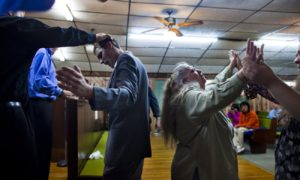Tuesday, September 26th, 2017
Stephan: Right now from Houston to Louisiana, Florida, the American Virgin Islands and, now, Puerto Rico have been devastated by extreme weather. Millions discommoded. What do you hear of it? Do you have any idea what is going on in Houston now? It is not easy to find out.
To my mind particularly in Puerto Rico I see gross failure of the federal government in dealing with these events, and I read that as a sign of a negative trend. If you realize this is a trend, and we are going to see more and more of this, commonsense should tell you that time, effort, and money spent preparing is directly correlated with minimal misery and death. But I see little sign of any of that.
Even worse in many ways the devastation in Puerto Rico has brought into focus what this report says, "As of March 2017, only 47 percent of Americans believed that a person born to Puerto Rican parents was an American citizen,
according to a Suffolk poll. By contrast, a whopping 30 percent believed that they would be a citizen of Puerto Rico, with the rest of the people surveyed either not knowing or claiming to be unsure."
Everything that is going on gets back to the American voter. That's the thing about democracies.
If a poll from early 2017 is to be believed, there are millions of Americans who don’t realize that when Hurricane Maria hit Puerto Rico, it directly impacted American citizens.
As of March 2017, only 47 percent of Americans believed that a person born to Puerto Rican parents was an American citizen, according to a Suffolk poll. By contrast, a whopping 30 percent believed that they would be a citizen of Puerto Rico, with the rest of the people surveyed either not knowing or claiming to be unsure.
The same findings were apparent in an Economic/YouGov poll taken less than one year earlier. As of May 2016, 43 percent of respondents believed that children of Puerto Rican parents in Puerto Rico would be American citizens, while 41 percent said they would be Puerto Rican citizens.
Although Americans’ ignorance of Puerto Ricans’ citizenship may be embarrassing, the matter is not free of complications. A pair of recent Supreme Court cases illustrated this point — Puerto Rico v. Sanchez Valle, in which the court ruled that it would count as Double Jeopardy for one person to be charged with the same crime in both the United States and Puerto Rico, and
No Comments
Tuesday, September 26th, 2017
Stephan: For 30 years I took care of my severely handicapped young brother, Alan, and I learned a lot, was taught a lot doing that. The general lesson was: given the poor healthcare of the United States if you want to take care of a handicapped person, whatever the handicap, you have to develop the skill set for doing that. Here's a place to start with Alzheimers.

Granddaughter helping her disabled grandmother walk with the aid of a walker.
Alzheimer’s disease affects about 5.4 million Americans, about 5.2 million of which are 65 and older. It can be your grandparent, your cousin, your sibling or even your parent who faces the diagnosis. Eventually, those with Alzheimer’s require round-the-clock care, and for many families, that means taking the loved one into their own home.
Alzheimer’s disease has unique symptoms and traits, so it’s likely that your home will need some modifications in order to create the best environment for your loved one. This guide will cover all the adjustments you should consider making room by room, with tips on creating both the safest surroundings and the most secure environment. Many of them are simple enough to complete on your own, but others may require the skills of a trained professional to ensure the safest result. Keep in mind that every home and instance of Alzheimer’s disease is different, and needs will vary from family […]
1 Comment
Monday, September 25th, 2017
Caitlin Dewey, Food Writer - The Washington Post
Stephan: There is so much that is changing, has already changed, as a result of the extreme weather events that have affected the United States. Here's a trend of which you might not even be aware.

Credit: TBO.com
Hurricane Irma plundered Florida’s orange belt, leaving a trail of uprooted trees, downed fruit and flooded groves worse than anything growers say they have seen in more than 20 years.
It could even be the knockout blow for a product — orange juice — that has been slipping in popularity among Americans, although the beverage still ranks as the country’s favorite “fruit.”
The most recent estimates of the widespread damage to Florida’s orange trees put the statewide losses as high as 70 percent. That could lead to orange shortages, price hikes and, for farmers, lost harvests — all on top of a debilitating plant disease called citrus greening and a long-term national decline in orange juice consumption.
“Significant is not the right word,” said Shannon Shepp, the executive director of the growers’ group Florida Department of Citrus, describing the damage to Florida’s orange juice industry. “It’s somewhere between significant and catastrophic. And that’s a big word — I don’t use it lightly.”
It could have implications not only for Florida agriculture but for the American diet.
No Comments
Monday, September 25th, 2017
Jason Wilson, - The Guardian (U.K.)
Stephan: The foreign press has begun to take an interest in White supremacy Christianity in the U.S. It is a trend whose implications I do not yet fully comprehend, but I see it playing out in the media of a number of countries. Here's an example.

Justin Fletcher, a Church of Lord Jesus member, is anointed with oil as Nancy Kennedy whirls in a trance at a church in West Virginia.
Credit: Jim Lo Scalzo/EPA
America is a Christian nation: this much has always been a political axiom, especially for conservatives. Even someone as godless and immoral as the 45th president feels the need to pay lip service to the idea. On the Christian Broadcasting Network last year, he summarized his own theological position with the phrase: “God is the ultimate.”
And in the conservative mind, American Christianity has long been hitched to whiteness. The right learned, over the second half of the 20th century, to talk about this connection using abstractions like “Judeo-Christian values”, alongside coded racial talk, to let voters know which side they were on.
But change is afoot, and US demographics are morphing with potentially far-reaching consequences. Last week, in a report entitled America’s Changing Religious Identity, the nonpartisan research organization Public Religion Research Institute […]
No Comments
Monday, September 25th, 2017
Casey Ross, - Scientific American
Stephan: The increasing power of the Roman Catholic Church over American hospitals, particularly rural hospitals is a trend with severe negative implications for women and, most significantly, poor women.
Here's the story.

Cardinal Daniel DiNardo, president of the United States Conference of Catholic Bishops, has been outspoken against abortion.
Credit: Gabriel Bouys
The rapid growth of Catholic-affiliated hospitals in the U.S. could significantly reduce access to inpatient sterilization procedures, according to a new study that examines the rising influence of religion on reproductive health services.
The study, published by the National Bureau of Economic Research, estimates that Catholic hospitals reduce the per-bed annual rates of inpatient abortions by 30 percent, and tubal ligations, or sterilization, by 31 percent.
Those impacts are being magnified by rapid consolidation among hospitals nationwide, a trend that resulted in a 22 percent increase in Catholic-sponsored or Catholic-affiliated hospitals between 2001 and 2016. The study found that the restrictions on reproductive health services at those facilities translates to more than 9,500 fewer tubal ligations per year.
“This alone represents a substantial cost to women, who must subsequently rely on other, more inconvenient suboptimal forms of contraception,” the study concluded.
The finding comes amid increasing debate over the influence of Catholic doctrine on access to reproductive health services. […]
No Comments














